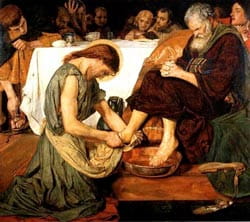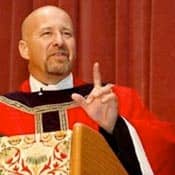Fr. Dwight Longenecker serves as parish priest of Our Lady of the Rosary parish and chaplain of St Joseph's Catholic School in Greenville, South Carolina. He is a speaker and author of several books including The Gargoyle Code. Throughout Lent 2011 you can read him twice-weekly at Slubgrip Instructs: Luciferian Lessons for Lent, here at Patheos.
 The accusations against Fr. John Corapi have unleashed a firestorm of comments from his devoted followers and those who are not impressed by him. Elizabeth Scalia sums it up here with common sense and compassion.
The accusations against Fr. John Corapi have unleashed a firestorm of comments from his devoted followers and those who are not impressed by him. Elizabeth Scalia sums it up here with common sense and compassion.
I have nothing much to say about Fr. Corapi himself, except that these things are complicated. Right now everyone should step back, take a deep breath, withhold judgment, and wait to see what happens.
I have no opinions at all about Fr. Corapi. All I know is that he is a Catholic media star, is supposed to be a holy man, a great preacher and evangelist. If he has fallen I'm sorry, but we should give him the benefit of the doubt.
I never met the man, but I do—in a roundabout way—have something to thank him for. It happened like this. I was visiting EWTN to do a show with Marcus Grodi and a couple rushed up in the airport and started saying how much they loved my preaching and my work. I was, of course, flattered to be 'recognized' and treated them with gracious condescension as I knew a 'media celebrity' should do to his adoring fans. I asked them politely which of my books they most enjoyed, and they looked confused, "What books? Aren't you Father Corapi?"
"No. I'm Fr. Longenecker."
"Oh, we never heard of you. We thought you were Fr. Corapi." And off they stalked, much disappointed.
So I must thank Fr. Corapi for indirectly giving me a salutary insight into my own overwhelming vanity and pride, and for giving me much to think about afterward. The job of being a priest is hard enough without the minefield of psychological tricks the devil has in store for us.
Think about it. Most priests have an awful lot of power. No one really tells us what to do. We can make up our own schedule. Many of us hold the checkbook for the parish and with a bit of ingenuity can spend money as we like. On top of all this we are surrounded by a group of people who really want to love us. They want to invest in us and want us to be the role model for them and their children. They are longing for someone to look up to, and we, poor souls that we are and longing to be loved, fall for it hook, line, and sinker.
Add to that any kind of a reputation as a writer, speaker, or 'Catholic celebrity' and the minefield is suddenly doubled. They thought you were wonderful to start with, and now thousands hang on your every word. You start to attract all sorts of vulnerable and needy people. If your celebrity status grows, you start enjoying 'success'. Media people want to jump on your bandwagon. Offers come your way. More money flows in. You can't help it. That goes with success.
Meanwhile, you're probably getting lonely because, while thousands love the person they think you are, very few people really know you and love you for who you really are. If you are a celibate priest (unless you've developed for yourself a good support system) you're stuck in that false world of celebrity with no one to turn to. If you don't have the inner strength, you may start believing in your false image yourself. It's hard not to.
Why do some priests start believing the false image of themselves? I'm afraid to say that too many men who are drawn to the priesthood already have a poor self-image. Often they lack real personal identity or they dislike the person they are. It's very attractive, therefore, to have a job where you put on a uniform and assume a different persona—the persona of a hero, a good guy, a knight in shining armor. Priests aren't the only ones who fall into this trap. Policemen and soldiers and nurses and others in the helping professions do the same.
So for the priest: every morning we put on the uniform. We're God's guys. We dress the part. We parade up and down in our long robes and we try our hardest to be saints. Much of it is a part we have to play. The church even teaches us that we're Christ personified. It's a part we have to play, and also a part we have to grow into, but until we grow into it fully we have to act the part.





